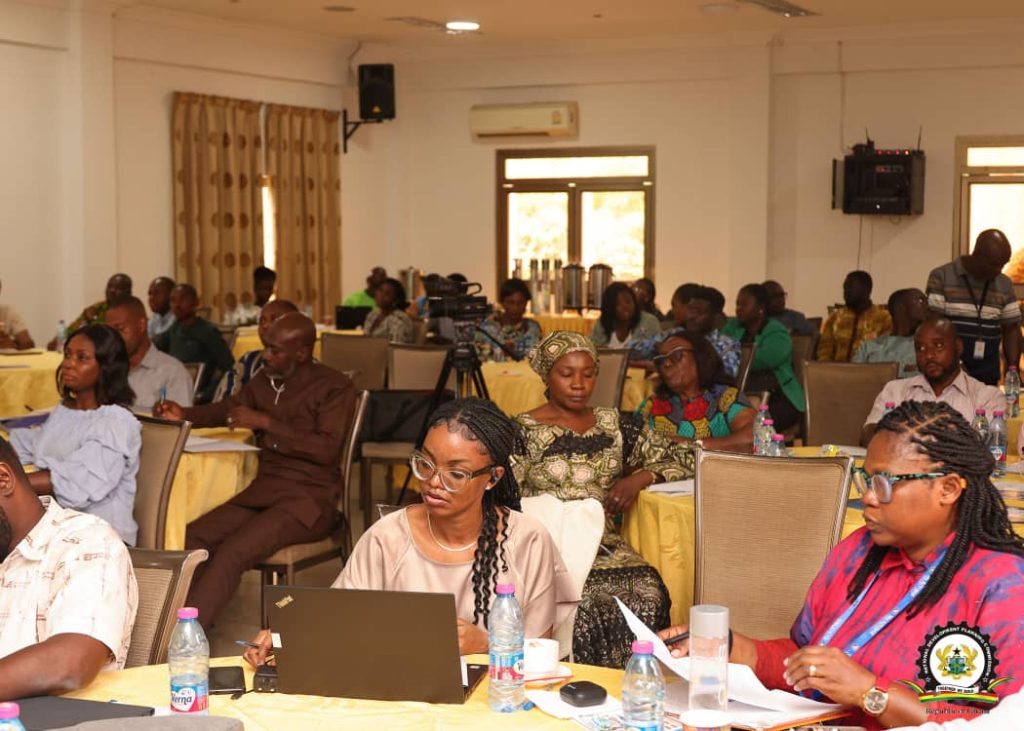Venue: Mensvic Hotel & Accra
Date: Last Week
1. Introduction
Ghana’s Sustainable Ocean Plan discourse brought together government officials, civil society, academia, and private sector stakeholders to shape a comprehensive framework for managing marine and coastal resources. The discussions emphasized that Ghana’s ocean space is both a source of economic wealth and ecological vulnerability. The objective of the sessions was to identify challenges, opportunities, and pathways toward a sustainable and inclusive blue economy.
2. Key Areas of Focus
2.1 Sustainable Fisheries Management
- Challenges Identified: Overfishing, illegal, unreported, and unregulated (IUU) fishing, and declining fish stocks.
- Proposed Actions:
- Enforce closed fishing seasons and implement stricter monitoring.
- Introduce artificial reefs to restore marine biodiversity.
- Empower small-scale fishers through training, access to modern equipment, and fair markets.
2.2 Marine Pollution Control
- Challenges Identified: High levels of plastic waste, poor coastal waste management systems, and land-based pollution.
- Proposed Actions:
- Expand waste management infrastructure in coastal areas.
- Promote waste-to-energy initiatives and recycling cooperatives.
- Launch sustained campaigns against single-use plastics.
2.3 Blue Economy Development & Financing
- Opportunities Highlighted: Sustainable tourism, renewable ocean energy, aquaculture, and marine transport.
- Proposed Actions:
- Mobilize funding from the government, the private sector, cooperatives, and international partners.
- Establish impact investment models targeting eco-tourism, aquaculture, and waste management.
- Build financial accountability frameworks to track investments and outcomes.
2.4 Climate Change and Coastal Resilience
- Challenges Identified: Coastal erosion, flooding, and climate vulnerability of port infrastructure.
- Proposed Actions:
- Invest in mangrove and seagrass restoration.
- Mainstream climate adaptation into infrastructure development.
- Adopt nature-based solutions to protect vulnerable communities.
2.5 Policy, Institutional, and Legal Frameworks
- Challenges Identified: Overlapping mandates, weak coordination, and inadequate enforcement.
- Proposed Actions:
- Harmonize policies across ministries and agencies.
- Establish a National Maritime Operations Center to coordinate security and governance.
- Integrate community knowledge and traditional practices into formal governance.
2.6 Community Engagement and Public Awareness
- Challenges Identified: Limited awareness and insufficient local participation.
- Proposed Actions:
- Use schools, churches, and social media platforms to promote ocean literacy.
- Empower women and marginalized groups to participate in decision-making.
- Create community-level ocean champions to drive sustainability initiatives.
2.7 Education, Data, and Knowledge Sharing
- Challenges Identified: Data gaps, low research capacity, and poor knowledge transfer.
- Proposed Actions:
- Strengthen ocean literacy through curriculum development and public campaigns.
- Invest in systematic data collection on species, ecosystems, and pollution.
- Harness science, technology, and innovation for ocean monitoring and sustainable use.
3. Stakeholder Contributions
- Government Representatives: Reaffirmed Ghana’s alignment with UN SDG 14 (Life Below Water) and international commitments under the High-Level Panel for a Sustainable Ocean Economy.
- Academia: Provided research insights on declining fish stocks, climate risks, and the need for stronger data systems.
- Civil Society: Advocated for transparency, inclusivity, and gender mainstreaming in ocean governance.
- Private Sector: Expressed readiness to invest in aquaculture, eco-tourism, transport, and renewable ocean energy.
4. Strategic Risks and Mitigation Measures
- Political Risks: Potential lack of political will and governance transitions. Mitigation: Embed resilience into policies and ensure bipartisan support.
- Economic Risks: Limited financing and overdependence on foreign aid. Mitigation: Develop diversified funding streams and engage the private sector.
- Institutional Risks: Mandate overlaps and weak enforcement. Mitigation: Create a coordinating body with legal authority.
- Environmental Risks: Climate change and ecosystem degradation. Mitigation: Adopt adaptive planning and ecosystem restoration programs.
5. Recommendations
- Establish a National Ocean Governance Council to oversee coordination and accountability.
- Develop a Blue Finance Strategy to attract investment from domestic and international stakeholders.
- Launch a National Ocean Literacy Campaign targeting schools, media, and community leaders.
- Strengthen partnerships with research institutions to bridge data gaps and enhance knowledge sharing.
- Mainstream gender equality and inclusivity in all ocean-related programs.
- Fast-track the establishment of a National Maritime Operations Center for security and coordination.
6. Conclusion
The Ghana Sustainable Ocean Plan discourse revealed strong national and stakeholder commitment to building a resilient and inclusive blue economy. The plan must balance ecological sustainability with economic opportunity, ensuring benefits for present and future generations. The next phase requires consolidating these discussions into actionable frameworks, securing financing, and building community ownership to guarantee long-term success.
End of In-depth Report

